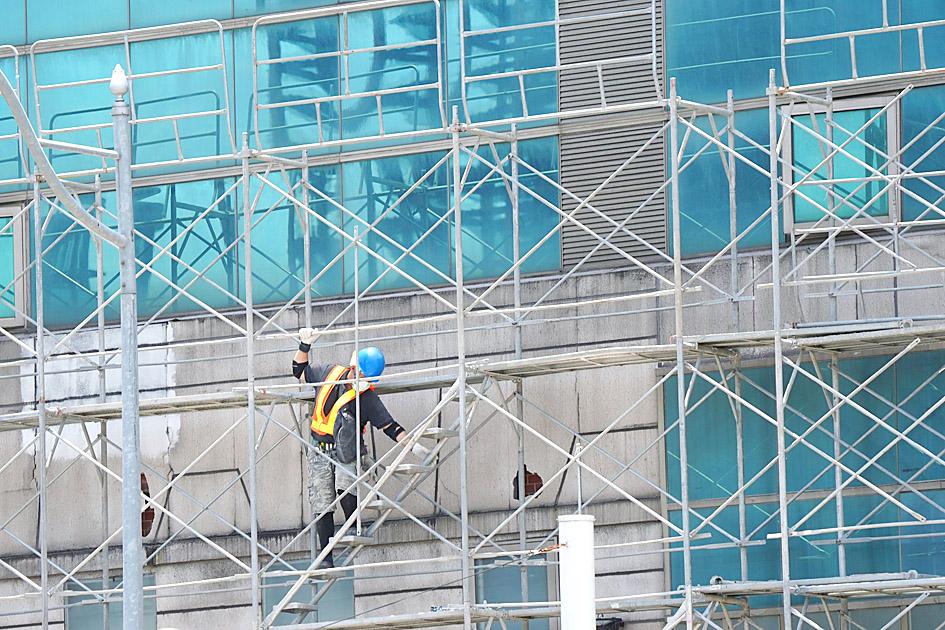The government’s business climate monitor for last month flashed “red” for a third straight month, indicating a booming economy that has not yet reflected a recent surge in COVID-19 infections in the nation, the National Development Council said yesterday.
The overall score increased by 1 point to 41, the highest since May 1987, thanks to improving customs-cleared exports, although the readings on export orders and new construction floor space retreated slightly, the council said.
“It is too early to gauge the pinch of the outbreak on the economy, as it would depend on how long it persists,” NDC research director Wu Ming-huei (吳明蕙) told an online news conference in Taipei.

Photo: CNA
The council uses a five-color code to depict the nation’s economic picture, with “green” indicating steady growth, “red” suggesting a boom and “blue” signaling a recession. Dual colors indicate a transition.
The health crisis could erode GDP growth for this year by 0.06 percentage points if authorities could bring it under control next month, Wu said, adding that the damage would deepen to 0.53 percentage points if the outbreak extends into the third quarter.
Wu expects the adverse impact to be limited to businesses reliant on domestic demand, while exporters might continue to benefit from inventory-building demand, as major economies emerge from the pandemic.
The index of leading indicators, which projects the economic scenario in the next six months, slipped 0.02 percent to 104.72, ending 11 months of increases after the sub-indices on export orders and construction floor area registered negative cyclical movements, the council said.
The slippage is small and harmless, as a majority of firms are expecting a business pickup moving forward, he said.
New construction floor area fell mainly due to fewer office building projects, while residential projects continued to increase, Wu said.
The index of coincident indicators, which mirrors the current economic situation, gained 0.77 percent to 106.17, rising for 11 consecutive months, the council said.
The council also said that it would release its business climate figures for this month in July, rather than next month, as the Directorate-General of Budget, Accounting and Statistics said it needed more time to compile unemployment data.

South Korea’s equity benchmark yesterday crossed a new milestone just a month after surpassing the once-unthinkable 5,000 mark as surging global memory demand powers the country’s biggest chipmakers. The KOSPI advanced as much as 2.6 percent to a record 6,123, with Samsung Electronics Co and SK Hynix Inc each gaining more than 2 percent. With the benchmark now up 45 percent this year, South Korea’s stock market capitalization has also moved past France’s, following last month’s overtaking of Germany’s. Long overlooked by foreign funds, despite being undervalued, South Korean stocks have now emerged as clear winners in the global market. The so-called “artificial intelligence

‘SEISMIC SHIFT’: The researcher forecast there would be about 1.1 billion mobile shipments this year, down from 1.26 billion the prior year and erasing years of gains The global smartphone market is expected to contract 12.9 percent this year due to the unprecedented memorychip shortage, marking “a crisis like no other,” researcher International Data Corp (IDC) said. The new forecast, a dramatic revision down from earlier estimates, gives the latest accounting of the ongoing memory crunch that is affecting every corner of the electronics industry. The demand for advanced memory to power artificial intelligence (AI) tasks has drained global supply until well into next year and jeopardizes the business model of many smartphone makers. IDC forecast about 1.1 billion mobile shipments this year, down from 1.26 billion the prior

People stand in a Pokemon store in Tokyo on Thursday. One of the world highest-grossing franchises is celebrated its 30th anniversary yesterday.

Chinese artificial intelligence (AI) start-up DeepSeek’s (深度求索) latest AI model, set to be released as soon as next week, was trained on Nvidia Corp’s most advanced AI chip, the Blackwell, a senior official of US President Donald Trump’s administration said on Monday, in what could represent a violation of US export controls. The US believes DeepSeek will remove the technical indicators that might reveal its use of American AI chips, the official said, adding that the Blackwells are likely clustered at its data center in Inner Mongolia, an autonomous region of China. The person declined to say how the US government received